
Meixishe·Governor's Mansion (Sanfang Qixiang Dongjiekou Subway Station Store) Reviews
Meixishe·Governor's Mansion (Sanfang Qixiang Dongjiekou Subway Station Store)
No.49 Ta Lane, Gulou District, Fuzhou, Fujian, ChinaView Hotel Details
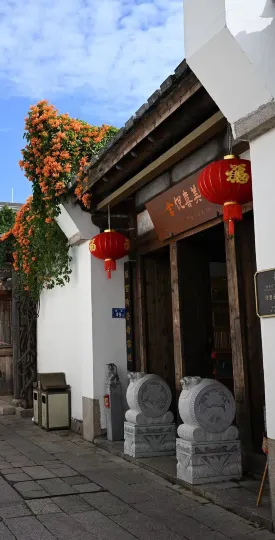



Check available rooms for your travel dates
We Price Match
1 night
Meixishe·Governor's Mansion (Sanfang Qixiang Dongjiekou Subway Station Store) Guest Reviews
4.7/5
Outstanding
1149 review
 Verified reviews
Verified reviewsLocation4.7
Amenities4.6
Service4.8
Cleanliness4.6
Filter by:
Sort by:
All reviews(1149)
Positive reviews(1119)
Reviews with photos/video(444)
Classy environment(244)
Easy to get around(152)
Friendly front desk staff(92)
Close to metro(59)
Well designed(46)
Excellent afternoon tea(29)
Too many mosquitoes(20)
Nice toiletries(18)
Negative reviews(29)

Anonymous User
Cozy Smart Room (Double bed)
Stayed in ott 2023
Business travelers
1 review
Very Good
Posted on 28 ott 2023
nothing bad about this place, except the wall sound proofing is a little weak. loud kids from next door and luggage noise from hallway can be an issue for some light sleeper. no breakfast within walking distance for early riser. next door fishball soup shop opens only at 10am, and nearby starbucks at 730am. plenty of street and restaurants for lunch and dinner. staff was very helpful.
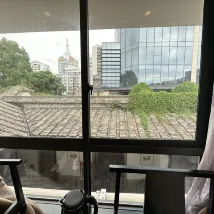

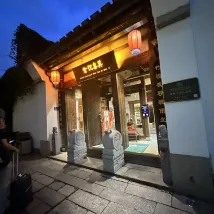


Response from Property: Dear Guest: Hello! Thank you very much for choosing to stay at Fuzhou Yueshe Hotel and sharing your experience. I was really moved to see your comments. I'm glad that the hotel has brought a good time for your trip. Your appreciation has really encouraged us. At the same time, thank you for your valuable comments. We will definitely do better and are committed to providing every guest with a feeling of staying at home. Welcome home and have a look!

jywang_25
Room-Luocheng | Double Bed Room-Kung Fu Tea Set + Smart Guest Control
Stayed in mar 2024
Business travelers
28 review
Outstanding
Posted on 4 apr 2024
very Nice

trixieguan
Smart Room (2 beds)
Stayed in gen 2024
Family
1 review
Outstanding
Posted on 5 gen 2024
very good

QixianSwing
Room-Luocheng | Double Bed Room-Kung Fu Tea Set + Smart Guest Control
Stayed in mag 2024
Family
7 review
Outstanding
Posted on 1 giu 2024
First of all, the transportation is very convenient. You can take the subway line 1 directly to the South Railway Station. The entrance of the alley is about 200 meters away from the station.
The geographical location is excellent. It is in the Sanfang Qixiang scenic area. The main street is across the alley. Next to the Dongbai Shopping Mall, it seems to be a mixture of ancient and modern times.
The room is large enough, with a tea table. The store gives an afternoon tea with tea and fruit. The fruity cinnamon tea is very fragrant and mellow. The service is very thoughtful, and there are many free small things and disposable daily necessities. I just hope that the hygiene of the toilet in the room can be improved. The smart toilet feels only semi-smart.
The corridor outside the room is paved with thick carpets, and you can't hear much noise from outside. It's quite quiet.
Overall, I am quite satisfied. I will consider it again when I come to Sanfang Qixiang next time.
Original TextTranslated by Google






6/9
Response from Property: 【Free teahouse, poetry, wine, flower tea】Thank you for choosing Fuzhou Meixiyue Siheyuan Hotel! Among the three lanes and seven alleys, Yijin Lane is the first of the "three lanes", formerly known as Tongchao Lane. According to the Qing Dynasty's "Rongcheng Archaeological Brief", "Lu Yun and Lu Zao brothers lived here as county governors in the Song Dynasty, named Lu Jin, and later Wang Yixiang was appointed as the chief judge of Jiangdong, and the name was changed to Yijin." It was called "Lu Jin" in the Song Dynasty and "Yi Jin" in the Ming Dynasty. In fact, it means that someone in the lane was an official outside, and then returned home with glory, so the name of the lane was changed to "Yi Jin". In the past, it was called "Tongchao" because this place was a water network area, and the tides of Fuzhou West Lake and South Lake could flow into the ditches of this lane. No. 16 in the lane was the residence of Zheng Pengcheng, a Jinshi in the Jiaqing period of the Qing Dynasty. The Yijin Lane waterside stage is the most distinctive. This is a wooden single-story platform with four pillars and a single bay. There is a clear water pond below, a patio in the middle, and a loft on the front. Watching drama performances here, the water is clear, the wind is clear, and the sound is clear. It has acoustic principles and aesthetic value. It is the only existing waterside stage in Fuzhou. No matter how good the introduction is, it is not as good as your personal experience. I hope to have the opportunity to walk through the streets and alleys with you to experience the humanistic charm of the old city and the unique beauty of Rongcheng~

Guest User
Compartment-Guiyu Double Bed Room-Private Space
Stayed in mag 2024
Couples
2 review
Amazing
Posted on 22 mag 2024
I stayed in my dream room for less than 500 RMB! The governor's house with ancient charm! Modern facilities are very complete, and it is located in Sanfang Qixiang! It is said that the essence of Sanfang Qixiang lies in the lanes, and this hotel is the essence of the essence. If you can't sleep, you can go directly to Sanfang Qixiang to see the "butt tree". Because after the founding of the People's Republic of China, Sanfang Qixiang was distributed to the people to live in, and the relocation was just completed, so I am not afraid at all.
Original TextTranslated by Google

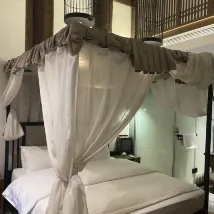




6/7
Response from Property: 【Full-time Butler Service】Thank you for choosing Fuzhou Meixiyueshe Courtyard Hotel! Among the three lanes and seven alleys, Anmin Lane is located in the south of Huang Lane, across Nanhou Street from Wenru Lane. Anmin Lane was formerly known as "Xilei Lane". It was renamed "Anmin" because of Huang Chao's entry into Fujian. According to the "Fuzhou Local Chronicles", "When Huang Chao, the peasant uprising army in the Tang Dynasty, entered Fujian, he showed Anmin to this lane, so it was named." There was an old Xilei Lane, which was known for its filial piety by Liu Zao of the Song Dynasty. Later, the prime minister Yu Shen lived here and changed the name to "Yuantai Yude". Historically, most of the people in the lane were social elites. Jia Ne, the governor of the Yuan Province, lived there. The old houses on the west side of the lane still retain the symmetrical pattern and simple charm. During the Anti-Japanese War, the New Fourth Army's Fujian Office was located there. Today, this old house is listed as a revolutionary cultural relic protection unit. No matter how good the introduction is, it is not as good as your personal experience. I hope to have the opportunity to experience the humanistic charm of the old city and the unique beauty of Rongcheng with you while walking through the streets and alleys~

Guest User
Room-Luocheng | Double Bed Room-Kung Fu Tea Set + Smart Guest Control
Stayed in mag 2024
Couples
9 review
Outstanding
Posted on 19 mag 2024
The hotel is in a great location, right in Sanfang Qixiang. You can walk along Taxiang for a while to the main street. If you go out to find food in the middle of the night, you can take a photo of the unmanned version of the love tree. The room is also quite large and the bed is very comfortable.
Original TextTranslated by Google
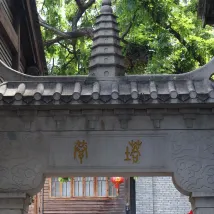





Response from Property: 【Full-time Butler Service】Thank you for choosing Fuzhou Meixiyueshe Courtyard Hotel! Among the three lanes and seven alleys, Anmin Lane is located in the south of Huang Lane, across Nanhou Street from Wenru Lane. Anmin Lane was formerly known as "Xilei Lane". It was renamed "Anmin" because of Huang Chao's entry into Fujian. According to the "Fuzhou Local Chronicles", "When Huang Chao, the peasant uprising army in the Tang Dynasty, entered Fujian, he showed Anmin to this lane, so it was named." There was an old Xilei Lane, which was known for its filial piety by Liu Zao of the Song Dynasty. Later, the prime minister Yu Shen lived here and changed the name to "Yuantai Yude". Historically, most of the people in the lane were social elites. Jia Ne, the governor of the Yuan Province, lived there. The old houses on the west side of the lane still retain the symmetrical pattern and simple charm. During the Anti-Japanese War, the New Fourth Army's Fujian Office was located there. Today, this old house is listed as a revolutionary cultural relic protection unit. No matter how good the introduction is, it is not as good as your personal experience. I hope to have the opportunity to experience the humanistic charm of the old city and the unique beauty of Rongcheng with you while walking through the streets and alleys~

Guest User
Cozy Smart Room (Double bed)
Stayed in mag 2024
Couples
2 review
Outstanding
Posted on 20 mag 2024
This trip to Fuzhou, I chose the Meiyuexishe in Sanfang Qixiang. It is very convenient to get in and out, because it is in Taxiang, and it is very convenient to go to various places. It is in the city center of the city center. It is super fun to visit, and the room is very clean. Next time I come to Fuzhou, I will continue to stay here.
Original TextTranslated by Google





Response from Property: 【Free teahouse, poetry, wine, flower tea】Thank you for choosing Fuzhou Meixiyue Siheyuan Hotel! Among the three lanes and seven alleys, Yijin Lane is the first of the "three lanes", formerly known as Tongchao Lane. According to the Qing Dynasty's "Rongcheng Archaeological Brief", "Lu Yun and Lu Zao brothers lived here as county governors in the Song Dynasty, named Lu Jin, and later Wang Yixiang was appointed as the chief judge of Jiangdong, and the name was changed to Yijin." It was called "Lu Jin" in the Song Dynasty and "Yi Jin" in the Ming Dynasty. In fact, it means that someone in the lane was an official outside, and then returned home with glory, so the name of the lane was changed to "Yi Jin". In the past, it was called "Tongchao" because this place was a water network area, and the tides of Fuzhou West Lake and South Lake could flow into the ditches of this lane. No. 16 in the lane was the residence of Zheng Pengcheng, a Jinshi in the Jiaqing period of the Qing Dynasty. The Yijin Lane waterside stage is the most distinctive. This is a wooden single-story platform with four pillars and a single bay. There is a clear water pond below, a patio in the middle, and a loft on the front. Watching drama performances here, the water is clear, the wind is clear, and the sound is clear. It has acoustic principles and aesthetic value. It is the only existing waterside stage in Fuzhou. No matter how good the introduction is, it is not as good as your personal experience. I hope to have the opportunity to walk through the streets and alleys with you to experience the humanistic charm of the old city and the unique beauty of Rongcheng~

Weiwei11
Building-Midsummer | Double Bed Room-Kung Fu Tea Set + Smart Guest Control
Stayed in mag 2024
Couples
1 review
Outstanding
Posted on 17 mag 2024
The environment is the best among the Three Lanes and Seven Alleys, and it is the former residence of Wang Youling! The housekeeper's service attitude is superb and he also helps to iron clothes
Original TextTranslated by Google






6/8
Response from Property: 【Three Lanes and Seven Alleys, Stay at Home】Thank you for choosing Fuzhou Meixiyueshe Courtyard Hotel! Among the Three Lanes and Seven Alleys, Wenru Lane is the second of the "Three Lanes", and the name has existed since the Song Dynasty. According to "A Brief History of Archaeology in Rongcheng", this lane "was originally named Rulin, and was renamed because Zheng Mu, the chief priest of the Song Dynasty, lived here". Zheng Mu served as the chief priest of the National Supervisor, an important official of the country's highest institution of learning, and was an official of the third rank. Zhang Jing, a famous general who fought against the Japanese in the Ming Dynasty, and Gan Guobao, a famous general in the Qing Dynasty who was the governor of Fujian and the general of Taiwan, also lived here. In Wenru Lane, there is a deep and quiet alley called Minshan Lane, commonly known as "Sanguan Hall", which is famous because the Sanguan Hall was built in the ancient times. According to the "Alleys and Lanes No. 2" in Lin Feng's "Records of Archaeology in Rongcheng" during the Daoguang period of the Qing Dynasty, "Sanguan Hall is located in Minshan Lane, south of Wenru Lane. There is a small lane to Guanglu Lane in the south, and the west entrance reaches the Changfengcang River. Most of them are named after temples. This one is named after Minshan Baofu Temple." This shows the close relationship between Sanguan Hall and Baofu Temple. No matter how good the introduction is, it is not as good as your personal experience. I hope to have the opportunity to walk through the streets and lanes with you to experience the humanistic charm of the old city and the unique beauty of Rongcheng~

Guest User
Room-Luocheng | Double Bed Room-Kung Fu Tea Set + Smart Guest Control
Stayed in mag 2024
Couples
2 review
Outstanding
Posted on 15 mag 2024
Super beautiful and very convenient
Shiguang Afternoon Tea: Delicious and fresh fruit tea is also delicious
It is a celebrity's former residence, right outside the old fish ball shop, less than 100 meters to the main road of Sanfang Qixiang, highly recommended
Original TextTranslated by Google


Response from Property: 【Qinqi calligraphy and painting, brush, ink, paper and inkstone】Thank you for choosing Fuzhou Meixiyueshe Courtyard Hotel! Among the three lanes and seven alleys, Huangxiang is south of Taxiang. Across Nanhou Street, it is connected to Yijinfang from east to west. According to the Minzhi, in the second year of Yongjia in the Jin Dynasty (308), Huang Yuanfang (280-375), also known as Yun and Yanfeng, a native of Gushi, fled to Fujian to avoid chaos and settled in Nanhou Street, Fuzhou, so it was called Huangxiang. At the end of the Tang Dynasty, Huang Pu (837-920), a proofreader of Chongwen, retired and lived here. When Huang Chao's army entered Fuzhou, they heard of Huang Pu's great name and ordered the soldiers to "extinguish the candles" when passing through Huangxiang at night and not to disturb his family. From then on, Huangxiang became famous. The alley has been home to many Confucian scholars and has become a gathering place for cultural celebrities and social celebrities. In the Qing Dynasty, the prefect Lin Wenying, the second place Lin Zhichun, the governor Li Fu, the couplet master Liang Zhangju, the Jinshi Chen Shouqi, Zhao Xin, etc., all lived in the alley. It was once renamed Xinmeifang, and later Xinmeili. There is a stone tablet with the words "Tang Huangpu Residence" in the alley, which was seen by people in the early 1950s. There is a courtyard in Huangxiang called "Xiaohuanglou", which is a cultural relic protection unit. No matter how good the introduction is, it is not as good as your personal experience. I hope to have the opportunity to walk with you through the streets and alleys to experience the humanistic charm of the old city and the unique beauty of Rongcheng~

Guest User
Room-Luocheng | Double Bed Room-Kung Fu Tea Set + Smart Guest Control
Stayed in mag 2024
Couples
5 review
Outstanding
Posted on 14 mag 2024
The hotel is renovated from an old house. It is located in the scenic area of Taxiang, very close to the subway entrance, and very convenient for travel. The environment of the hotel is quiet in the bustling city, and it is also very quiet at night. It is not as soundproof as imagined in old houses. The hotel service is also very good. The hotel front desk is very enthusiastic. When we checked in, we directly upgraded the room. Afternoon tea was also delivered to the room. The overall experience is good. I will stay here next time.
Original TextTranslated by Google






Response from Property: 【High-end bedding, brand daily necessities】Thank you for choosing Fuzhou Meixiyueshe Courtyard Hotel! Among the three lanes and seven alleys, Yangqiao Lane is the northernmost of the "seven lanes". Yangqiao Lane was formerly known as Dengjun Lane, and was renamed because it could reach Yangqiao in the west. During the Republic of China, it was expanded into a road due to the needs of urban construction, so it was later renamed "Yangqiao Road". The Lin family mansion at the intersection of Yangqiao Road and Nanhou Street was the residence of the martyr Lin Juemin during his lifetime. This martyr's former residence was later sold to Xie Luanen, the grandfather of the writer Bing Xin. Bing Xin lived here when she was a child, and there is also a vivid description of the former residence in "My Hometown". After the alley was expanded into a road, a considerable part of the former residence of the martyr Lin Juemin and the female writer Bing Xin (see the entry "Fuzhou Bing Xin's Former Residence") was preserved. There is a "Shuangpao Bridge" in Yangqiao Lane (South), which is small in scale but has many legends. First, the inland river channel where the bridge is located is the place where the east and west waters "join the tide". The inland river wonder of "a breath of water from thousands of miles away" can be felt most vividly here. Second, there is a pair of banyan trees growing towards each other on both sides of the Shuangpao Bridge. Their branches and leaves are intertwined in the air, embracing each other to form a shade. Therefore, there is a sad story of a young man and a woman who died for love. It has been passed down for a long time, so that later generations can no longer tell whether love came first and then the trees, or whether the trees came first and then the bridge, or vice versa. Recently, I heard that an overseas writer compared it with the swan song of "Romeo and Juliet", which added a bit of sadness. However, due to the river reconstruction and urban construction, the Qiongdong River under the bridge has been filled up. Later, a landscape pool was built under the bridge to let people know that there used to be an inland river here. Shuangpao Bridge has gradually changed from a "bridge" to a "pavilion" on the street, becoming a place for passers-by to rest and drink tea. No matter how good the introduction is, it is not as good as your personal experience. I hope to have the opportunity to experience the humanistic charm of the old city and the unique beauty of the banyan city with you while walking through the streets and alleys~

Yuguxiaoxuezha
Room-Luocheng | Double Bed Room-Kung Fu Tea Set + Smart Guest Control
Stayed in mag 2024
Business travelers
32 review
Outstanding
Posted on 14 mag 2024
Shiguang Afternoon Tea: Great
《Scholar's Calligraphy Experience》: Awesome
I always choose this hotel when I go on business trips, and I am very satisfied. The location is very good.
Hygiene: Clean
Facilities: Complete
Service: Great
Book early on weekends and holidays, it is very popular. It is in the scenic area, and I will choose it next time.
Original TextTranslated by Google
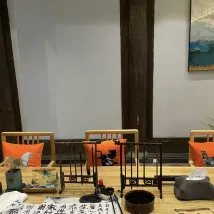


Response from Property: 【High-end bedding, brand daily necessities】Thank you for choosing Fuzhou Meixiyueshe Courtyard Hotel! Among the three lanes and seven alleys, Yangqiao Lane is the northernmost of the "seven lanes". Yangqiao Lane was formerly known as Dengjun Lane, and was renamed because it could reach Yangqiao in the west. During the Republic of China, it was expanded into a road due to the needs of urban construction, so it was later renamed "Yangqiao Road". The Lin family mansion at the intersection of Yangqiao Road and Nanhou Street was the residence of the martyr Lin Juemin during his lifetime. This martyr's former residence was later sold to Xie Luanen, the grandfather of the writer Bing Xin. Bing Xin lived here when she was a child, and there is also a vivid description of the former residence in "My Hometown". After the alley was expanded into a road, a considerable part of the former residence of the martyr Lin Juemin and the female writer Bing Xin (see the entry "Fuzhou Bing Xin's Former Residence") was preserved. There is a "Shuangpao Bridge" in Yangqiao Lane (South), which is small in scale but has many legends. First, the inland river channel where the bridge is located is the place where the east and west waters "join the tide". The inland river wonder of "a breath of water from thousands of miles away" can be felt most vividly here. Second, there is a pair of banyan trees growing towards each other on both sides of the Shuangpao Bridge. Their branches and leaves are intertwined in the air, embracing each other to form a shade. Therefore, there is a sad story of a young man and a woman who died for love. It has been passed down for a long time, so that later generations can no longer tell whether love came first and then the trees, or whether the trees came first and then the bridge, or vice versa. Recently, I heard that an overseas writer compared it with the swan song of "Romeo and Juliet", which added a bit of sadness. However, due to the river reconstruction and urban construction, the Qiongdong River under the bridge has been filled up. Later, a landscape pool was built under the bridge to let people know that there used to be an inland river here. Shuangpao Bridge has gradually changed from a "bridge" to a "pavilion" on the street, becoming a place for passers-by to rest and drink tea. No matter how good the introduction is, it is not as good as your personal experience. I hope to have the opportunity to experience the humanistic charm of the old city and the unique beauty of the banyan city with you while walking through the streets and alleys~

Anonymous User
Room-Luocheng | Double Bed Room-Kung Fu Tea Set + Smart Guest Control
Stayed in mag 2024
Solo travelers
52 review
Outstanding
Posted on 12 mag 2024
The location is very good, and the service is very, very good. There is afternoon tea, a place to drink tea, and cute kittens. It is a bit noisy during the day, but it is cost-effective.
Original TextTranslated by Google






Response from Property: 【Qinqi calligraphy and painting, brush, ink, paper and inkstone】Thank you for choosing Fuzhou Meixiyueshe Courtyard Hotel! Among the three lanes and seven alleys, Huangxiang is south of Taxiang. Across Nanhou Street, it is connected to Yijinfang from east to west. According to the Minzhi, in the second year of Yongjia in the Jin Dynasty (308), Huang Yuanfang (280-375), also known as Yun and Yanfeng, a native of Gushi, fled to Fujian to avoid chaos and settled in Nanhou Street, Fuzhou, so it was called Huangxiang. At the end of the Tang Dynasty, Huang Pu (837-920), a proofreader of Chongwen, retired and lived here. When Huang Chao's army entered Fuzhou, they heard of Huang Pu's great name and ordered the soldiers to "extinguish the candles" when passing through Huangxiang at night and not to disturb his family. From then on, Huangxiang became famous. The alley has been home to many Confucian scholars and has become a gathering place for cultural celebrities and social celebrities. In the Qing Dynasty, the prefect Lin Wenying, the second place Lin Zhichun, the governor Li Fu, the couplet master Liang Zhangju, the Jinshi Chen Shouqi, Zhao Xin, etc., all lived in the alley. It was once renamed Xinmeifang, and later Xinmeili. There is a stone tablet with the words "Tang Huangpu Residence" in the alley, which was seen by people in the early 1950s. There is a courtyard in Huangxiang called "Xiaohuanglou", which is a cultural relic protection unit. No matter how good the introduction is, it is not as good as your personal experience. I hope to have the opportunity to walk with you through the streets and alleys to experience the humanistic charm of the old city and the unique beauty of Rongcheng~

Xiunianbuxiu
Building-Midsummer | Double Bed Room-Kung Fu Tea Set + Smart Guest Control
Stayed in mag 2024
Business travelers
71 review
Great
Posted on 8 mag 2024
The location is very good, right next to the scenic spot. The courtyard is not big but has a unique layout. It is very considerate to help carry the luggage as soon as you enter the door. The room is of moderate size. The bedding and consumables are of high quality. They are very good to use and very comfortable to sleep. They also gave earplugs and eye masks, which is very considerate.
The only drawback is that there are mosquitoes at night. It took three attempts to kill them, which affected sleep. The toilet flushing sound is a little loud. It is quiet at night and the air conditioner is turned off. There is still a little buzzing sound. These two points are a bit uncomfortable. The whole house intelligence did not find any control unit and guidance for any smart facilities. The Hermes bath set was not sent actively. I called to ask and they said it was out of stock. It's just like that. Fortunately, they said they would mail it. I hope the promise will be fulfilled. It's a good store. I hope you can do better.
Original TextTranslated by Google


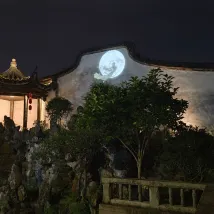
Response from Property: 【Qinqi calligraphy and painting, brush, ink, paper and inkstone】Thank you for choosing Fuzhou Meixiyueshe Courtyard Hotel! Among the three lanes and seven alleys, Huangxiang is south of Taxiang. Across Nanhou Street, it is connected to Yijinfang from east to west. According to the Minzhi, in the second year of Yongjia in the Jin Dynasty (308), Huang Yuanfang (280-375), also known as Yun and Yanfeng, a native of Gushi, fled to Fujian to avoid chaos and settled in Nanhou Street, Fuzhou, so it was called Huangxiang. At the end of the Tang Dynasty, Huang Pu (837-920), a proofreader of Chongwen, retired and lived here. When Huang Chao's army entered Fuzhou, they heard of Huang Pu's great name and ordered the soldiers to "extinguish the candles" when passing through Huangxiang at night and not to disturb his family. From then on, Huangxiang became famous. The alley has been home to many Confucian scholars and has become a gathering place for cultural celebrities and social celebrities. In the Qing Dynasty, the prefect Lin Wenying, the second place Lin Zhichun, the governor Li Fu, the couplet master Liang Zhangju, the Jinshi Chen Shouqi, Zhao Xin, etc., all lived in the alley. It was once renamed Xinmeifang, and later Xinmeili. There is a stone tablet with the words "Tang Huangpu Residence" in the alley, which was seen by people in the early 1950s. There is a courtyard in Huangxiang called "Xiaohuanglou", which is a cultural relic protection unit. No matter how good the introduction is, it is not as good as your personal experience. I hope to have the opportunity to walk with you through the streets and alleys to experience the humanistic charm of the old city and the unique beauty of Rongcheng~

🔱kelintesi🐬🐳
Compartment-Guiyu Double Bed Room-Private Space
Stayed in mag 2024
Business travelers
8 review
Outstanding
Posted on 7 mag 2024
A very nice B&B, with an antique style. There is a subway station right outside the door, which is very convenient. The other end is Sanfang Qixiang. It was very fun to walk around and eat along the way! ! You can also have afternoon tea when you have time, which is really comfortable! !
Original TextTranslated by Google


Response from Property: 【Full-time Butler Service】Thank you for choosing Fuzhou Meixiyueshe Courtyard Hotel! Among the three lanes and seven alleys, Anmin Lane is located in the south of Huang Lane, across Nanhou Street from Wenru Lane. Anmin Lane was formerly known as "Xilei Lane". It was renamed "Anmin" because of Huang Chao's entry into Fujian. According to the "Fuzhou Local Chronicles", "When Huang Chao, the peasant uprising army in the Tang Dynasty, entered Fujian, he showed Anmin to this lane, so it was named." There was an old Xilei Lane, which was known for its filial piety by Liu Zao of the Song Dynasty. Later, the prime minister Yu Shen lived here and changed the name to "Yuantai Yude". Historically, most of the people in the lane were social elites. Jia Ne, the governor of the Yuan Province, lived there. The old houses on the west side of the lane still retain the symmetrical pattern and simple charm. During the Anti-Japanese War, the New Fourth Army's Fujian Office was located there. Today, this old house is listed as a revolutionary cultural relic protection unit. No matter how good the introduction is, it is not as good as your personal experience. I hope to have the opportunity to experience the humanistic charm of the old city and the unique beauty of Rongcheng with you while walking through the streets and alleys~

Guest User
Room-Luocheng | Double Bed Room-Kung Fu Tea Set + Smart Guest Control
Stayed in apr 2024
Solo travelers
1 review
Outstanding
Posted on 30 apr 2024
The room is very spacious. Although it is an old house, the sound insulation is good and I was not disturbed by the noise outside. The room is on the second floor and occasionally I can see cats running outside. The public area is also very artistic.
Original TextTranslated by Google



Response from Property: 【Full-time Butler Service】Thank you for choosing Fuzhou Meixiyueshe Courtyard Hotel! Among the three lanes and seven alleys, Anmin Lane is located in the south of Huang Lane, across Nanhou Street from Wenru Lane. Anmin Lane was formerly known as "Xilei Lane". It was renamed "Anmin" because of Huang Chao's entry into Fujian. According to the "Fuzhou Local Chronicles", "When Huang Chao, the peasant uprising army in the Tang Dynasty, entered Fujian, he showed Anmin to this lane, so it was named." There was an old Xilei Lane, which was known for its filial piety by Liu Zao of the Song Dynasty. Later, the prime minister Yu Shen lived here and changed the name to "Yuantai Yude". Historically, most of the people in the lane were social elites. Jia Ne, the governor of the Yuan Province, lived here. The old houses on the west side of the lane still retain the symmetrical pattern and simple charm. During the Anti-Japanese War, the New Fourth Army's Fujian Office was located there. Today, this old house is listed as a revolutionary cultural relic protection unit. No matter how good the introduction is, it is not as good as your personal experience. I hope to have the opportunity to experience the humanistic charm of the old city and the unique beauty of Rongcheng with you while walking through the streets and alleys~
Trending Searches
Recommended for you
Chambers Premier Suites Kuala Lumpur ReviewsHotel New Grand ReviewsAzuLine Hotel Mediterráneo ReviewsSlow house, xiannvushan guiyuan boutique holiday home stay ReviewsSerenada Golden Palace Hotel ReviewsThe Westin Copley Place, Boston ReviewsSuknai Al Yasmine Hail ReviewsM.house ReviewsAzumaen ReviewsPremiere Classe Valence Nord - Saint-Marcel-LÈS-Valence ReviewsYijian Haoting Holiday Hotel ReviewsMarriott Resort Palm Jumeirah, Dubai ReviewsHotel Laghetto Rio Grande ReviewsFRIDA HOTELS ReviewsHOTEL MYSTAYS Sapporo Nakajima Park ReviewsKadi Konagi Thermal Hotel ReviewsGreen Rich Hotel Iwakuni Ekimae (Artificial Hot Spring Futamata Yunohana) ReviewsShaSa Resort - Luxury Beachfront Suites ReviewsIberostar Selection Sábila ReviewsSon Tra Resort & Spa Danang ReviewsDuoyuan Youth Hostel (Nanjing Xinjiekou Subway Station)Sheraton Hefei Xinzhan HotelChongqing. pushang PUSHA HOTEL (Jiefangbei Baixiangju Branch)JI Hotel Wuhan Hubei University of TechnologyYazhi Hotel (Dongguan Chang'an Jinlong Center Branch)Blue Horizon Hotel ZhuchengHampton by Hilton Beijing South Railway StationDorsett Wuhan (walking street)Vienna International Hotel (Dongguan Mayong Central Avenue)The Plimplace Hotel